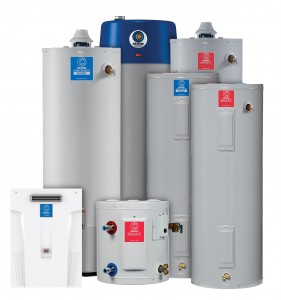 Water heaters are the 2nd highest energy consuming appliance, and represent nearly ¼ of a home’s energy expenses. Every family requires hot water to cook, clean, bathe, launder clothes and much more, so naturally this puts great demand on a water heater. Although they’re typically regarded as an out of sight, out of mind convenience, most water heaters run 24/7 and do require attention to ensure performance and efficiency.
Water heaters are the 2nd highest energy consuming appliance, and represent nearly ¼ of a home’s energy expenses. Every family requires hot water to cook, clean, bathe, launder clothes and much more, so naturally this puts great demand on a water heater. Although they’re typically regarded as an out of sight, out of mind convenience, most water heaters run 24/7 and do require attention to ensure performance and efficiency.
Whether you’re experiencing problems with a traditional tank model, or it’s simply taking up too much space, there are alternatives. Tankless water heaters have quickly become a popular, energy efficient, space saving option. Unlike a traditional tank water heater, the tankless model heats water on demand, only when needed, instead of constantly running to pre-heat it. Perhaps one of the greatest benefits is in its name—tankless water heaters don’t involve an unsightly, bulky tank!
The energy and space saving advantages of tankless models make the choice sound easy, but there are some very important factors to consider before converting. During your research, ask yourself the following questions…
Is there a problem with your traditional water heater?
If a replacement is in the forecast, it’s definitely smart to consider tankless models. In spring 2015, the Department of Energy began phasing out traditional water heaters that did not meet new energy efficiency standards. These guidelines affect the size and style of traditional models on the market. This change alone leads many homeowners to look into tankless models.
Is your traditional water heater taking up valuable space?
Tankless models are compact, and don’t take up useable square footage in areas like utility rooms, closets and basements. For people in apartments, condos or homes lacking closet or storage space, tankless models are convenient. They are easily installed on interior or exterior walls of the property. Tankless models require proper venting, so this must be considered when planning out the location for install.
What is the investment worth to you?
Tankless models can cost considerably more than traditional water heaters. However, life expectancy is 20 years or more in comparison to tank models that only last 10-15 years. For a home with average hot water needs, tankless models can save around 25% on energy costs.
What are the hot water needs for your family?
According to the American Water Works Association, each person uses roughly 20-30 gallons of hot water per day. Depending on how many people use hot water in the home determines need. If you don’t require an endless supply of hot water, a traditional tank model may suffice although tankless offers more energy and space savings long-term.
RJ Tilley understands that buying a water heater is a very important decision for a homeowner. Our expert plumbers are well-versed in every make and model water heater on the market. Allow us to answer all your questions and help you decide on the right unit for your family. Contact RJ Tilley today to find out more about energy efficient traditional and tankless water heaters.








